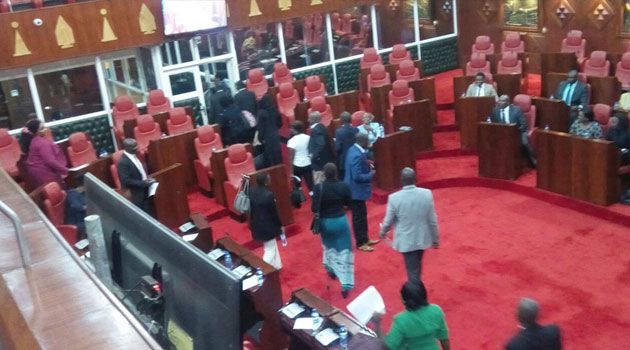A thick cloud of oppression is brewing over Zambia
COMMENT
With elections looming on 12 August, a thick cloud of oppression has been brewing over Zambia. In recent years, the authorities have carried out brutal repression, including systematic harassment and intimidation of human rights defenders and activists, and the restriction of civic space. The death of the founding president Kenneth Kaunda last week, has left the nation, and indeed the region, in a state of mourning, drawing a sharp contrast between his independence vision of unity and the current state of affairs.
Since the last election in 2016, when the Patriotic Front retained its power, a climate of repression has set in, characterised by the closing of civic space and political intolerance of peaceful dissent. Over the past five years, there has been a creation of a fear society through the demonising of civil society and political opposition, the punishing of dissent, and weaponising the law and applying selectively it against anyone critical of the state. People who are seen to be critical of the government have been victimised and faced sustained harassment and intimidation by the state and non-state actors aligned with the Patriotic Front, including having their rights to freedom of association, peaceful assembly and expression restricted.
In 2018, hip-hop musician and notable activist Chama Fumba, popularly known as Pilato, was jailed upon his return to Zambia from South Africa after the release of his song Koswe Mumpoto, which translates to “rat in a pot” in the Bemba language after some people interpreted it to mean that he was comparing the ruling elite to rats. His arrest, harassment and intimidation were a shocking demonstration of how far the Zambian government was prepared to go to strangle all criticism and crack down on human rights.
No less than two years later, in the midst of the Covid-19 pandemic, authorities ordered the cancellation of independent television news channel Prime TV’s broadcasting licence. It was alleged that the station refused to air the government’s Covid-19 public-awareness campaigns because it was owed money for airing previous state-sponsored advertisements.
However, looking closely at the closure of Prime TV, it seemed to have something to do with politics, because the station had been targeted before for its critical reporting. In March 2019, the independent broadcaster was suspended for 30 days by the Independent Broadcasting Authority, citing failure to comply with the conditions of its broadcasting licence. Caught in the whirling downfall of media freedom, along with Pilato and Prime TV, was Mafken Radio, whose offices were threatened with being burned down by Patriotic Front cadres because they hosted the leader of the opposition party, Hakainde Hichilema.
Laura Miti is one of many fervent anti-corruption and human rights activists who have faced constant harassment and intimidation for protesting and exposing allegations of government corruption. In December 2019, along with fellow activist Bornwell Mwewa, she was arrested and charged with assault on a police officer and disorderly conduct for showing solidarity to Pilato after he was arrested for ”unlawful assembly” in violation of the Public Order Act. This was for hosting a youth forum aimed at raising awareness about civic responsibility. When Miti and Mwewa tried to obtain information from police on Pilato’s arrest, they were arrested and Miti’s phone was forcibly taken from her.
While Pilato, Miti and Mwewa have since been acquitted of all charges, the authorities have continued to target individuals based on their peaceful expression of opinions, especially those critical of the government. For example, in June 2020 a number of youth protested what they termed endemic corruption and excessive use of force by the police. The government’s response was to deploy fully armed riot police across Lusaka, only to be outwitted by youth protesters, who took their dissent to the internet via live-stream to avoid a confrontation.
The exercise of human rights online is also under increasing threat, as shown by the case of Sishuwa Sishuwa, a political commentator and academic. Sishuwa received threats from some Patriotic Front cadres, after he opined in the Mail & Guardian that the country could be headed for violence after the August election because of the prevailing political tension and demonisation of opposition voices.
The University of Zambia, Sishuwa’s employer, has since distanced itself from him. Sishuwa’s case, which has attracted rebuke from across the continent and the world community of academia, exemplifies not just a-well calculated attack on freedom of expression, but also a more vicious threat to academic freedom and autonomy of universities that postcolonial states in Africa promised to keep and defend.
Authorities are now targeting the digital space with recently passed laws such as the Cyber Security and Cyber Crimes Act. With its loosely defined terms, such as “cyber-bullying”, the law is open to abuse by the authorities to target and censor human-rights defenders and activists and deny rights to privacy and information. The controversial law has been fiercely opposed by civil society, with many people arguing that it is a serious threat to the human rights of people on- and offline.
The political trends over the past five years are pointing to fears of human rights violations and crack downs as the political campaign gains momentum ahead of the August election. Over the past five years, Amnesty International has kept a close eye on these and other human rights events in Zambia and we will be releasing our next instalment on Monday 28 June. As Zambians head to the polls, authorities must guarantee and ensure human rights, including the rights to freedom of association and peaceful assembly. Anything short of that will be a travesty.

